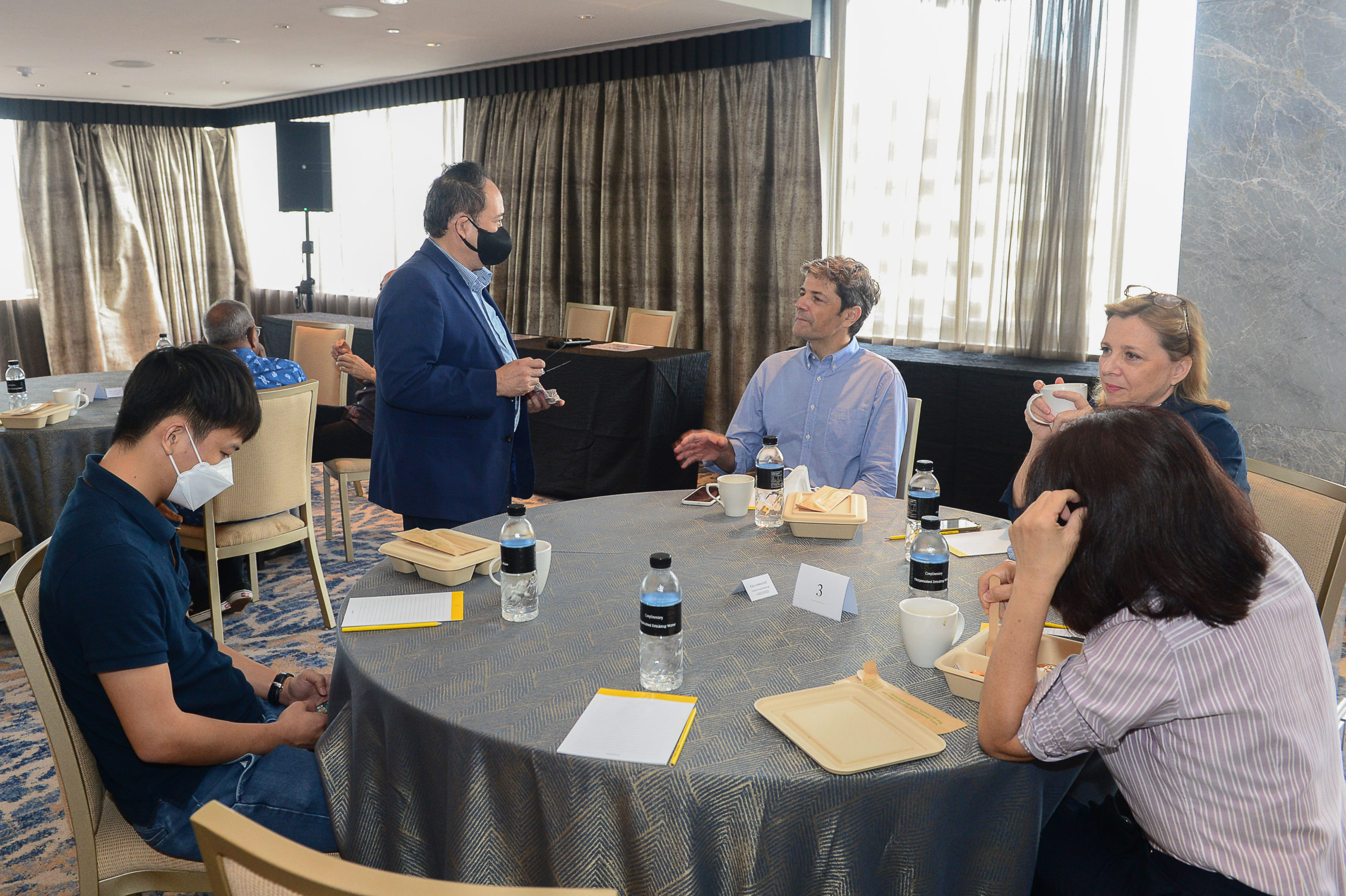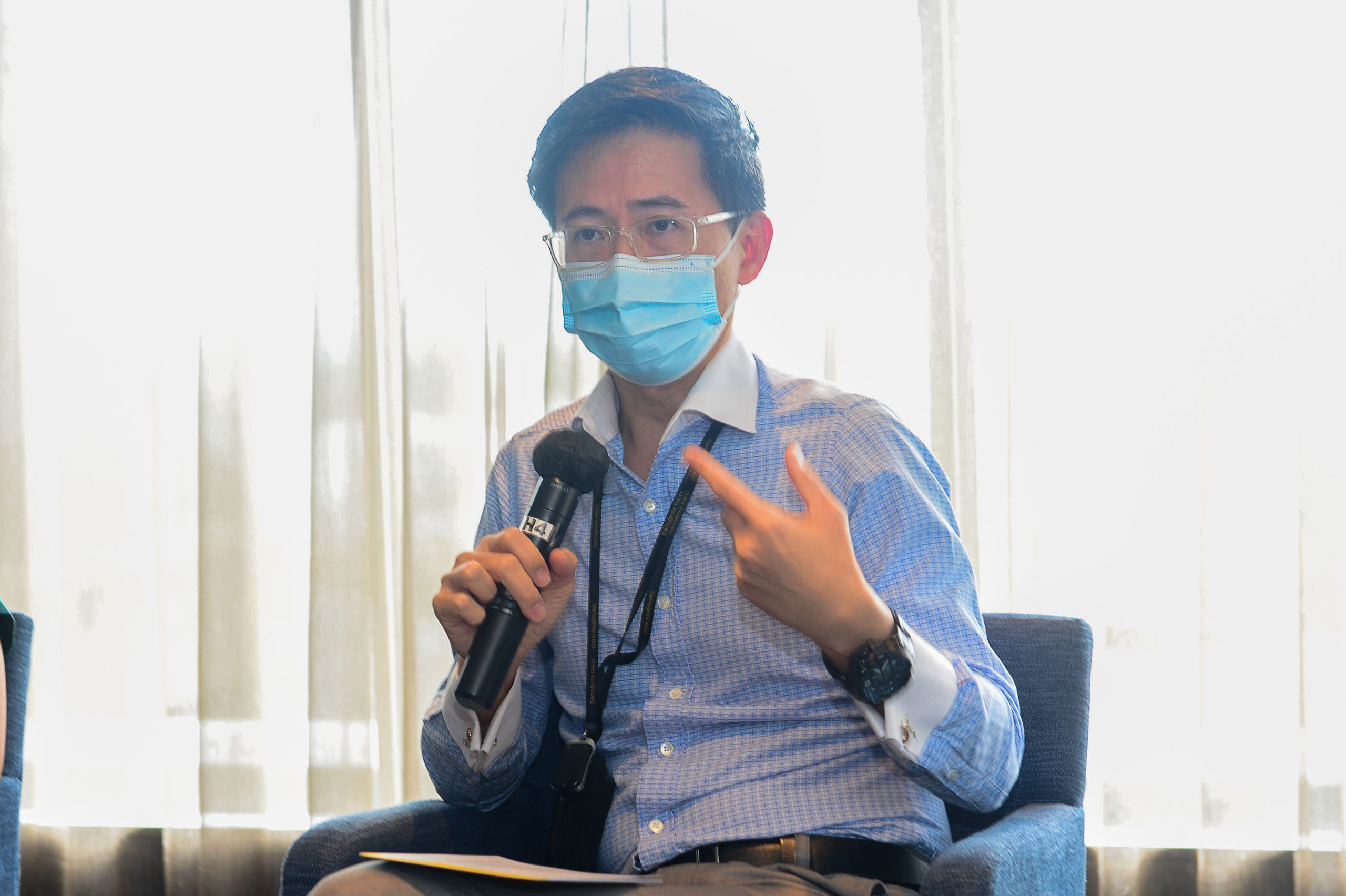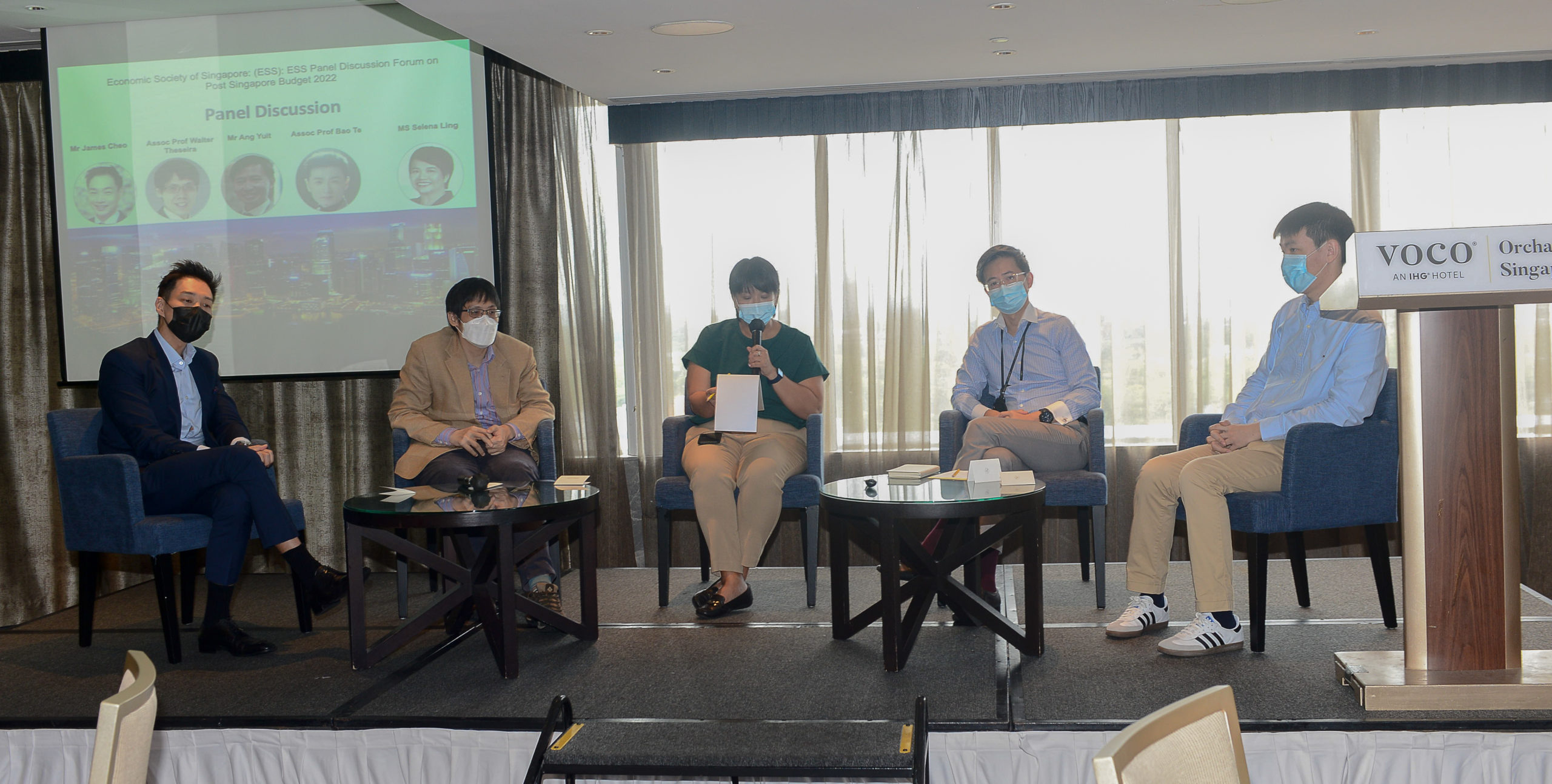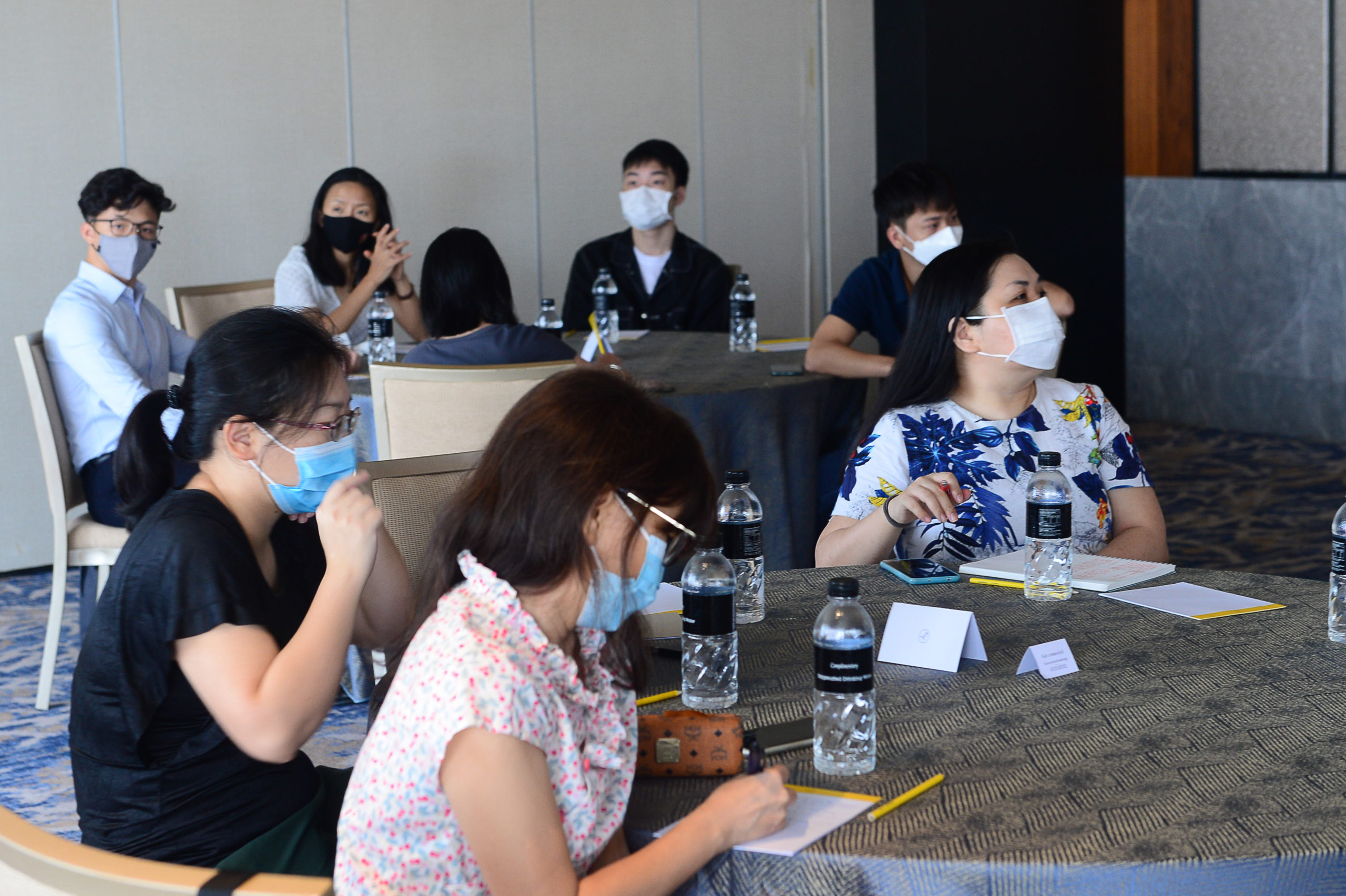As Singapore emerges from the Covid-19 pandemic and prepares for her next phase of recovery, this year’s Budget 2022 was aptly named “Charting Our New Way Forward Together”, as announced by Finance Minister Lawrence Wong on Friday, 18th February 2022. The Economic Society of Singapore’s (ESS) Post-budget Forum was held one day after, on 19th February. In it, our panelists of industry and academic experts discussed whether the content of Budget 2022 embodied the theme. Selena ANG, Chief Economist and Head of Treasury Research and Strategy for OCBC bank and Vice President for ESS, chaired and opened the forum by alluding to several key points that we should pay attention to regarding the budget:
- Is Budget 2022 fair? For whom?
- Since it is titled as our new way forward, how fast do we get there?
- What is the right balance between Goods and Services Tax (GST) and corporate taxation?
These are some of the questions that our panelists shed insight on, among others.
Our first panelist speaker was Mr James CHEO, Managing Director and Chief Investment Officer, Southeast Asia for HSBC bank. He shared that GST is inflationary in itself, and agreed that the delay to 2023 will be good to give time for the current inflationary pressure to subside.
“Due to the pandemic, a lot of macroeconomics volatility and uncertainty is created,” Mr. Cheo commented. “In a more uncertain environment, you want (your budget) to be more balanced rather than expansionary.”
“How much (our) society is willing to pay to be greener and to be more inclusive?” he added, referring to the carbon tax increment from the current S$5/ton to S$25/ton from 2024, S$45 from 2026, S$50-80 by 2030, and the wealth redistribution effects of the budget; taxing the rich and redistributing it to the needy. Potentially, Singapore might lose some of her appeal as a low-tax and attractive country for foreign investments and high net-worth talents, in a tradeoff for inclusivity and a greener economy.
This sentiment was also echoed by subsequent panelists.
Associate Professor Walter THESEIRA of Singapore University of Social Sciences (SUSS), the second panelist, shared that Singapore is still very tax lean as compared to the OECD countries, even considering the proposed tax increments as announced in the budget. He feels that the GST increase has a nominal impact.
“… increase from 3.8% to 4.8% of GDP collected through GST, even with the 2% increase. This will still be less than half of the OECD’s 11%.”
“So, despite these changes, the overall structure’s change is nominal.” Prof. Theseira commented.
Of course, Prof. Theseira also added that it is not an apple-to-apple comparison between countries, since Singapore has the Central Provident Fund (CPF) mandatory contribution which actually self-finances a lot of our healthcare and social spending.
Professor BAO Te of Nanyang Technological University (NTU), the fourth panelist, added that Budget 2022 has been more progressive in structure as compared to previous budgets. Referring to the increased spending of S$9 billion over the next five years on thw Workfare Income Supplement (WIS) scheme and the new Progressive Wage Credit (PWC) scheme, Prof. Bao said this is similar to a “minimum wage” in other countries but with a twist. Since firms receive co-funding from the government to supplement workers’ income, chances of job loss is smaller. There is also increased job stability and security for the target group of workers.
Approaching from a behaviourial signalling standpoint, he noted that the policies influences consumer behaviour too. It signals to the market an emphasis on better Corporate Social Responsibility (CSR). In turn, this will nudge an increase of the willingness to pay for CSR by the consumers.
“For example, people are 10% more willing to invest in accredited firms, providing them with more liquidity.” he said.
Speaking about firms, Mr. Yuit ANG, Vice President for Association of Small and Medium Enterprises (SMEs) acknowledged that the government, instead of handing out assistance and grants, can support SMEs more directly by utilising them. He urged for a change to the procurement policies by the government which, over the years, have leaned towards larger enterprises (like Multi-national Companies, MNCs). The government should, through procurement practices, incentivise SMEs to grow.
“The thinking can be to grow SMEs by supporting them; by buying their services instead of just giving handouts and grants.” he reasoned.
Mr. Ang also urged SMEs to tap previously unexplored pools of manpower, referring to the stricter Employment Pass (EP) and S pass requirements announced in the budget. Mid-career job switchers and older workers are such potential pools. He also believed that with the government signalling the greening of economy through Budget 2022, SMEs can tap into the green industry and “ride along the journey”.
The panel took many questions from attendees during the Question and Answer section.
Among others, Associate Professor Jamus Lim, associate professor of economics at ESSEC Business School and Member of Parliament, asked whether the welfare transfer policies of WIS, PMC and GST rebate vouchers are self-sufficient, and whether their effects are just transitory.
Regarding self-sufficiency, Prof. Theseira feels that this is just an accounting exercise; the government has a lot of discretion to label something as current expense, or to earmark contributions for future. He is confident that balancing the budget is, on paper, relatively easy. The actual fiscal situation of the government is more opaque.
Regarding the transitory aspect, Prof. Theseira feels that there is still insufficient recognition towards addressing the socio-economic aspects of the inequality puzzle. He feels that the two problems of having a sustainable income and re-training oneself to make alternative career choices are actually related. Policies that just address one problem won’t go very far; one has little mental capacity to do much about their situation when they are living hand to mouth. Akin to the classic example of giving a man a fish versus teaching him how to fish, the government can still do more to ensure that their basic needs are met so the lower-waged individuals can have extra mental capacity and motivation to pull themselves up to a better situation.
Professor Euston QUAH, President of ESS and Albert Winsemius Professor at NTU, also asked whether the panel is shocked by the fivefold increment of the carbon tax.
Through dialogue between the panel and the floor, all concurred that the jump of carbon tax is surprising, but the trend and eventual goal is not. The government is signalling that it is determined to continue greening the Singapore economy, and comparing the trajectory of Singapore against European countries, we are still behind. Therefore, we have to increase our carbon tax at a steeper rate to catch up.
Through the discourse from the panelists and exchanging ideas with the floor, a lot of enlightening and even contentious topics were discussed. The ESS Post-budget forum shed light on many of the concerned areas that still need more attention from the government, as well as appreciation on the many good directions that Singapore is headed.
Credits: Jackson TEH












